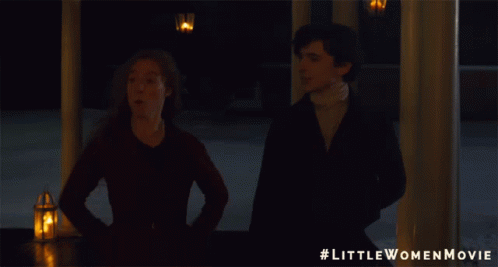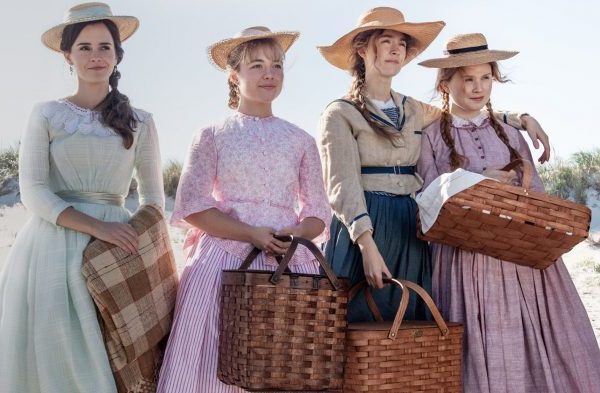Louisa May Alcott’s Little Women was originally published in 1868 and 1869 (as two volumes). Since then, the narrative of the March sisters has been consumed by generations—grandmothers and granddaughters alike have read the book (as well as grandfathers and grandsons, in the dark of night when no one could see them). It’s one of those publications that has stood the test of time like Romeo and Juliet, Pride and Prejudice, Slaughterhouse-Five, or People magazine (somehow true). Alcott’s novel has been adapted into countless stage plays and films, so many in fact, that the story itself could be called stale.
Before director Greta Gerwig’s 2019 remake, the idea of another Little Women film was equatable to another spin on A Christmas Carol (sorry Robert Zemeckis). This might be why the Academy snubbed Gerwig in the Best Director category: they just assumed the film wrote and directed itself. It didn’t. Gerwig took something everyone knew and made it her own. Scratch that, she took something everyone thought they knew and modernized it—she made it accessible to Generations X, Y, and Z.
The masterful reimagining of Alcott’s classic novel stays faithful to its source material while tweaking all of the constipated romanticism. It was pulled off with an impeccable amount of focus and foresight. Gerwig was an apex on set, while also being pregnant (but wearing baggy clothes so no one would know). She is a humble mad scientist (in the best way). The entire film feels like a nuclear bomb of kick-ass femininity, one not possible without Gerwig. Little Women itself is being aptly recognized with a nomination in the Best Motion Picture category at the 92nd Academy Awards. With that in mind, here are all of the ways Gerwig modernized Little Women.
Cover Photo: Columbia Pictures
Educate yourself: 8 Insightful Things Men Can Learn From ‘Little Women’
Mandatory Talks: The Progressive and Regressive Picks of the 2020 Oscars
Follow Mandatory on Facebook, Twitter, and Instagram.
little women
-
Parallel Timelines

The novel and other adaptations follow Meg, Jo, Beth, and Amy from childhood into adulthood, linearly. Instead of opening with Christmas during the Civil War (like the novel), Gerwig's film begins with an adult Jo in her publisher's office, navigating the life we haven't yet seen her grow into. The film then cuts back and forth between periods in the life of the March sisters, interweaving moments seamlessly. The juxtaposition of scenes and emotion makes all of the arcs that much more effective—it's as if the story was always meant to be told this way (and it's the time jumping is much more obvious than season one of The Witcher).
-
Organic Vibe and Dialogue

Much of the film's situational dialogue (or dancing like the GIF above), even the stuff taken directly from the book, feels much more organic. Watching period pieces (especially ones based on novels) is sometimes jarring. Characters' motivations may seem shallow and archaic; Gerwig fixes all of this by allowing her characters to talk over one another and react to things much in the way that we would today. Instead of being motivated by a pretty dress, they are motivated by economic necessity, and instead of letting a self-loathing man-child determine their worth, they decide that for themselves.
-
Laurie Is a Bit of a Fuckboy

Not that he wasn't always. However, his status is clear in this one. Laurie is always worried about where the women are; to be fair, it kind of feels like his proclivity to cruise for chicks is the whole reason he befriends the March sisters. As a viewer, you don't even want him and Jo to end up together, which is good. You encourage Jo's independence. Gerwig fleshes this out even more when Laurie stands up Amy at the ball in Europe. She finds him, drunk, on a couch with two girls. His response: "I feel caught." That argument was not in the book and exists to set a realistic foundation for Amy and his relationship moving forward—he doesn't just start taking her seriously because she wore a pretty dress. No offense, Laurie, we don't hate the player, we just hate your 19th-century game.
-
The Depiction of Faith Isn't Preachy

Christianity plays a huge role in Alcott's novel. Gerwig's film mentions things like sin and prayer but doesn't stress anything specific. Instead, the adaptation focuses on the March family's kindness rather than their theology. For example, they are charitable to the poor immigrant family down the road not because it's the Protestant way but because it's right —the importance of the act of kindness rather than faith.
-
It's All Very 'Deadpool'

Not that Jo ever turns to the camera and calls out Wolverine for riding her coattails with the whole impulsive and quick to anger thing but Little Women feels aware of its position as a film. It's meta. Not only does Jo end up writing Little Women at the end but there are various moments that call out some of the original narrative's historical restraints.
-
Jo is Louisa May Alcott

Jo has always been depicted as a writer, except in this new adaptation, Jo is a writer writing Little Women. On top of this, Jo struggles with much of the same publication issues Louisa May Alcott reportedly went through; quotes like "and if the main character's a girl, make sure she's married by the end," epitomize what Alcott went through when writing Little Women. All of the conversations Jo has with her publisher outline the original narrative of the March family and its ending amplifies the Jo March/Louisa May Alcott parallels.
-
The Ending Is Open to Interpretation...In an 'Inception' Kind of Way

The Professor Bhaer Jo "falls for" in the movie is her intellectual equal and good-looking (which isn't the case in the book). As the film closes in on its ending, it becomes more meta, steering away from the things that would make sense for Jo's character: she spent the whole film not wanting to get married. As Jo's family pleads with her to storm after Bhaer, it cuts back to Jo and her publisher, and her publisher says, "So she doesn't get married?" After a lot of convincing, Jo finally agrees to end the novel with a marriage, hence the brightly painted happy ending. While we are being shown that aesthetically pleasing image, we also see Jo in New York, unmarried (probably the real ending). Gerwig lets audiences chose which ending they want—which reality is true for them.









